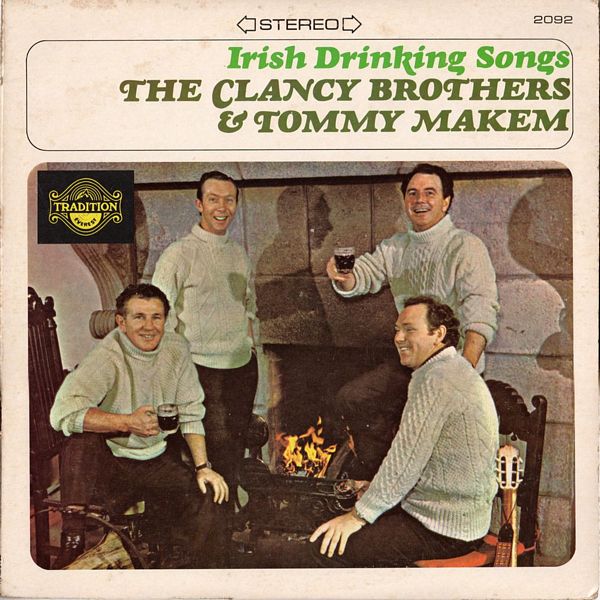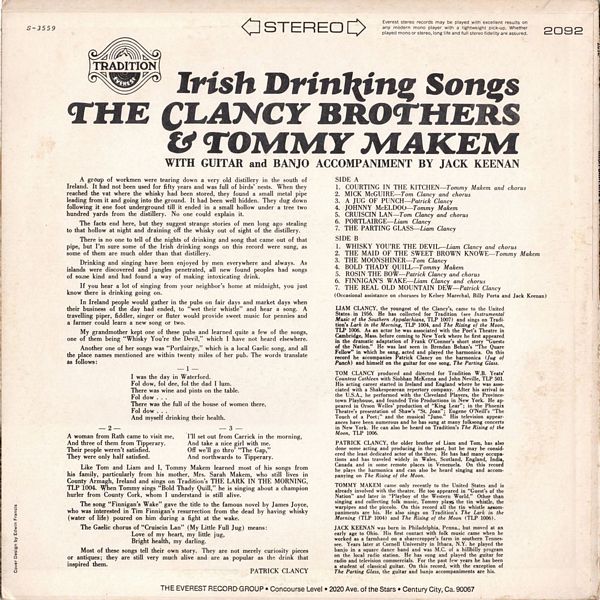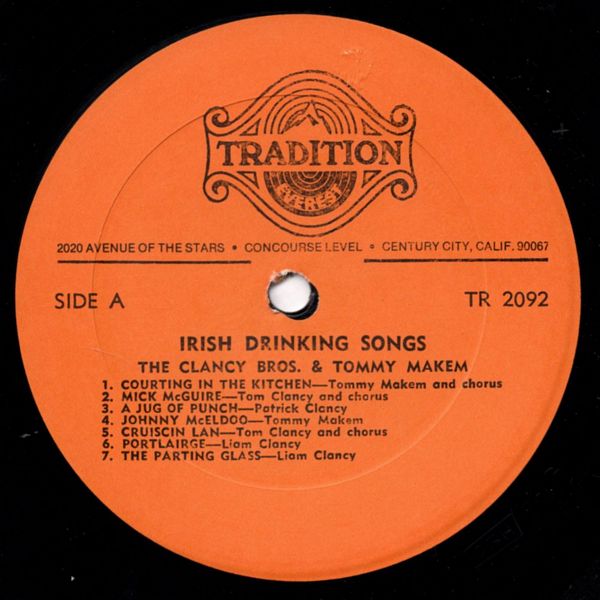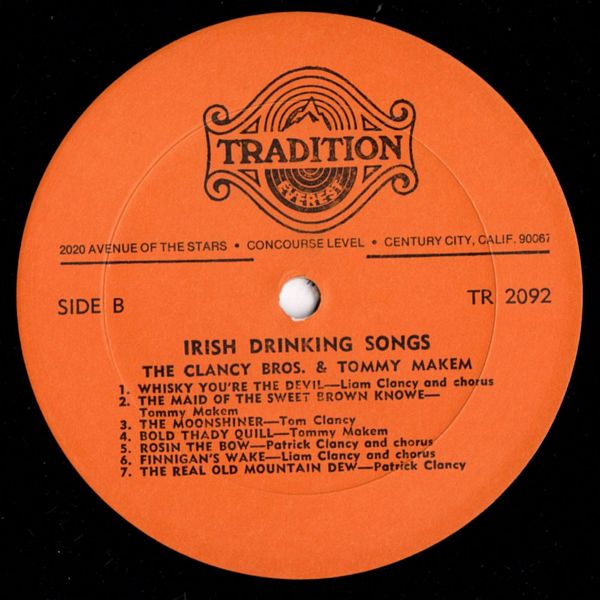

 |


 |
Sleeve Notes
A group of workmen were tearing down a very old distillery in the south of Ireland. It had not been used for fifty years and was full of birds' nests. When they reached the vat where the whisky had been stored, they found a small metal pipe leading from it and going into the ground. It had been well hidden. They dug down following it one foot underground till it ended in a small hollow under a tree two hundred yards from the distillery. No one could explain it.
The facts end here, but they suggest strange stories of men long ago stealing to that hollow at night and draining off the whisky out of sight of the distillery.
There is no one to tell of the nights of drinking and song that came out of that pipe, But I'm sure some of the Irish drinking songs on this record were sung, as some of them are much older than that distillery.
Drinking and singing have been enjoyed by men everywhere and always. As islands were discovered and jungles penetrated, all new found peoples had songs of some kind and had found a way of making intoxicating drink. If you hear a lot of singing from your neighbor's home at midnight, you just know there is drinking going on.
In Ireland people would gather in the pubs on fair days and market days when their business of the day had ended, to "wet their whistle" and hear n song. A travelling piper, fiddler, singer or fluter would provide sweet music for pennies and a farmer could learn a new song or two.
My grandmother kept one of these pubs and learned quite a few of the songs, one of them being "Whisky You're the Devil," which I have not heard elsewhere.
Another one of her songs was "Portlairge," which is a local Gaelic song, and all the place names mentioned are within twenty miles of her pub. The words translate as follows:
— 1 —
I was the day in Waterford.
Fol dow, fol dee, fol the dad I lum.
There was wine and pints on the table.
Fol dow . . .
There was the full of the house of women there,
Fol dow . . .
And myself drinking their health.
— 2 —
A woman from Rath came to visit me,
And three of them from Tipperary.
Their people weren't satisfied.
They were only half satisfied.
— 3 —
I'll set out from Carrick in the rooming,
And take a nice girl with me.
Off we'll go thro' "The Gap,"
And northwards to Tipperary.
Like Tom and Liam and I, Tommy Makem learned most of his songs from his family, particularly from his mother, Mrs. Sarah Makem, who still lives in County Armagh, Ireland and sings on Tradition's THE LARK IN THE MORNING, TLP 1004. When Tommy sings "Bold Thady Quill," he is singing about a champion hurler from County Cork, whom I understand is still alive.
The song "Finnigan's Wake" gave the title to the famous novel by James Joyce, who was interested in Tim Finnigan's resurrection from the dead by having whisky (water of life) poured on him during a fight at the wake.
The Gaelic chorus of "Cruiscin Lan" (My Little Full Jug) means:
Love of my heart, my little jug,
Bright health, my darling.
Most of these songs tell their own story. They are not merely curiosity pieces or antiques; they are still very much alive and are as popular as the drink that inspired them.
PATRICK CLANCY
LIAM CLANCY, the youngest of the Clancy's, came to the United States in 1956. He has collected for Tradition (see Instrumental Music of the Southern Appalachians, TLP 1007) and sings on Tradition's Lark in the Morning, TLP 1004, and The Rising of the Moon, TLP 1006. As an actor he was associated with the Poet's Theatre in Cambridge, Mass, before coming to New York where he first appeared in the dramatic adaptation of Frank O'Connor's short story "Guests of the Nation." He was last seen in Brendan Behan's "The Quare Fellow" in which he sang, acted and played the harmonica. On this record he accompanies Patrick Clancy on the harmonica (Jug of Punch) and himself on the guitar for one song, The Parting Glass.
TOM CLANCY produced and directed for Tradition W.B. Yeats' Countess Cathleen with Siobhan McKenna and John Neville, TLP 501. His acting career started in Ireland and England where he was associated with a Shakespearean repertory company. After his arrival in the U.S.A., he performed with the Cleveland Players, the Province-town Playhouse, and founded Trio Productions in New York. He appeared in Orson Welles' production of "King Lear"; in the Phoenix Theatre's presentation of Shaw's "St. Joan"; Eugene O'Neill's "The Touch of a Poet;" and the musical "Juno." His television appearances have been numerous and he has sung at many folksong concerts in New York. He can also be heard on Tradition's The Rising of the Moon, TLP 1006.
PATRICK CLANCY, the older brother of Liam and Tom, has also done some acting and producing in the past, but he may be considered the least dedicated actor of the three. He has had many occupations and has traveled widely in Wales, Scotland, England, India, Canada and in some remote places in Venezuela. On this record he plays the harmonica and can also be heard singing and accompanying on The Rising of the Moon.
TOMMY MAKEM came only recently to the United States and is already involved with the theatre. He too appeared in "Guest's of the Nation" and later in "Playboy of the Western World." Other than singing and collecting folk music, Tommy plays the tin whistle, the warpipes and the piccolo. On this record all the tin whistle accompaniments are his. He also sings on Tradition's Lark in the Morning (TLP 1004) and The Rising of the Moon (TLP 1006).
JACK KEENAN was born in Philadelphia, Penna., but moved at an early age to Ohio. His first contact with folk music came when he worked as a farmhand on a sharecropper's farm in southern Tennessee. Years later at Cornell University in Ithaca, N.Y. he played the banjo in a square dance band and was M.C. of a hillbilly program on the local radio station. He has sung and played the guitar for radio and television commercials. For the past few years he has been a student of classical guitar. On this record, with the exception of The Parting Glass, the guitar and banjo accompaniments are his.